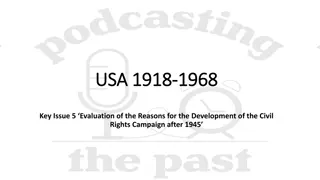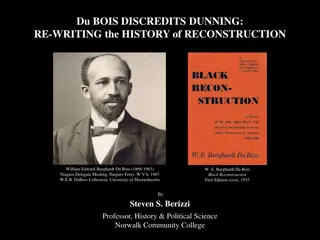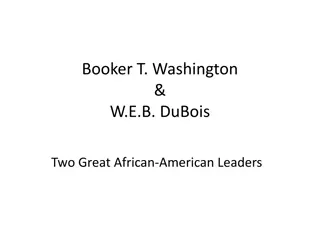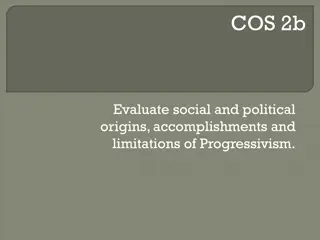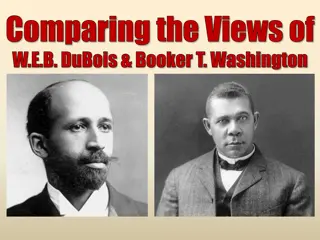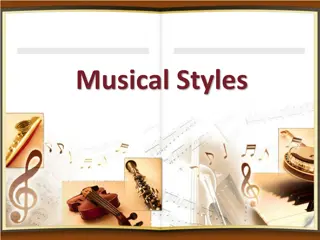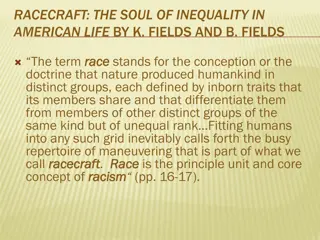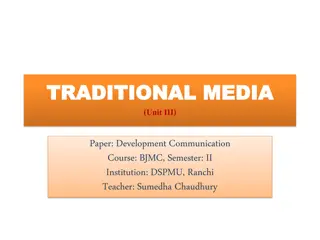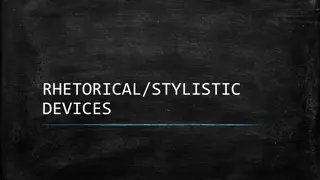Analysis of Du Bois' Use of Prejudice and Rhetorical Devices in 'Souls of Black Folk'
In W.E.B. Du Bois' "Souls of Black Folk," he explores the concept of prejudice and its impact on the African American community. Du Bois contrasts white Americans' perspective on prejudice as a defense of culture with the reality of how it humiliates and undermines African Americans. Through powerful language and imagery, he conveys the destructive effects of prejudice and the self-doubt it instills in the community. Additionally, Du Bois utilizes rhetorical devices to develop central ideas, focusing on unity, talent development, and the ideal of human brotherhood.
Download Presentation

Please find below an Image/Link to download the presentation.
The content on the website is provided AS IS for your information and personal use only. It may not be sold, licensed, or shared on other websites without obtaining consent from the author.If you encounter any issues during the download, it is possible that the publisher has removed the file from their server.
You are allowed to download the files provided on this website for personal or commercial use, subject to the condition that they are used lawfully. All files are the property of their respective owners.
The content on the website is provided AS IS for your information and personal use only. It may not be sold, licensed, or shared on other websites without obtaining consent from the author.
E N D
Presentation Transcript
SOULS OF BLACK FOLK W.E.B DUBIOS
AIM: Clear your desks: -One sheet of loose leaf -Excerpt
POP QUIZ How does Du Bois use and refine the meaning of the key term prejudice over the course of paragraph 10 & 11? Analyze how Du Bois's style and content contribute to the power, persuasiveness, or beauty of paragraph 11.
Du Bois first gives white Americans explanation of prejudice as the natural defence of culture against barbarism (par. 10). Then Du Bois contrasts this explanation with African Americans experience of prejudice as personal disrespect and mockery. By contrasting white Americans explanation with African Americans experience, Du Bois refines the meaning of the term prejudice to demonstrate that although white Americans think of prejudice as necessary and good because it defends culture, it is a harmful force that systematic[ally] humiliat[es] and undermines the African American community.
Du Bois uses words like breed, diseased, dying, and suicide (par. 11) to describe the potentially rapid decline of his race in [t]he facing of so vast a prejudice (par. 11). Repeatedly using words associated with sickness and death contributes to the power of the text by reminding readers of the destructive effects of prejudice. This section of the text explores the self-doubt that prejudice causes African Americans to feel about their intelligence and their abilities. Du Bois s assertion that this self-doubt is so damaging that it will lead to the suicide of [the] race contributes to the power of this paragraph, because it highlights the severity of the effects of prejudice on African Americans, while simultaneously encouraging African Americans to continue to pursue education and social responsibilities despite the criticism of the Nation.
AIM: What rhetorical devices does Du Bois use to develop a central idea in paragraph 12?
DO NOW: Formulate a list of central ideas in Of Our Spiritual Survivings by W.E.B. Du Bios:
DISCUSSION How does Du Bois clarify what he means by the unifying ideal of Race ? To what central idea does the phrase fostering and developing the traits and talents of the Negro connect? How does the phrase in large conformity to the greater ideals of the American Republic refine the ideal of human brotherhood ? How does Du Bois s use of rhetorical questions further refine his idea of the unifying ideal of Race ?
MID-UNIT ASSESSMENT Your Task: Rely on your reading and analysis of Of Our Spiritual Strivings to write a well-developed response to the following prompt: Identify a central idea in Of Our Spiritual Strivings and analyze how Du Bois uses figurative language or rhetoric to develop this central idea. Your writing will be assessed using the Text Analysis Rubric. Guidelines Be sure to: Closely read the prompt Address all elements of the prompt in your response Paraphrase, quote, and reference relevant facts and details Organize your ideas in a cohesive and coherent manner Maintain a formal style of writing Use appropriate and varied transitions Follow the conventions of standard written English



